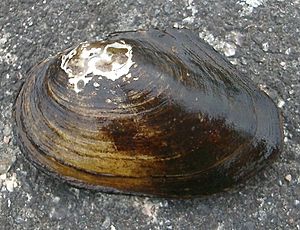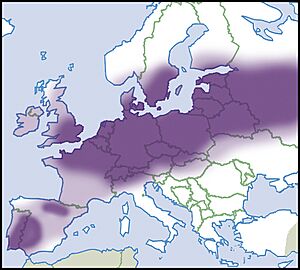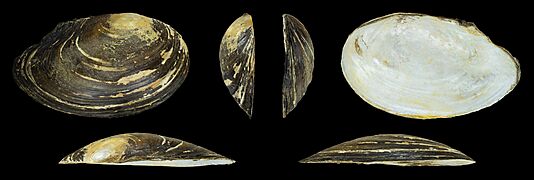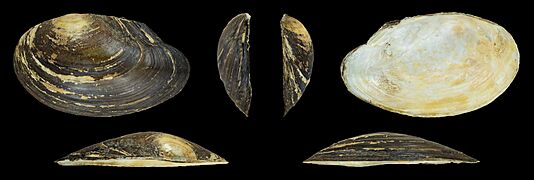Duck mussel facts for kids
Quick facts for kids Duck mussel |
|
|---|---|
 |
|
| A live individual of the duck mussel, Anodonta anatina | |
| Conservation status | |
| Scientific classification |
|
| Kingdom: | Animalia |
| Phylum: | Mollusca |
| Class: | Bivalvia |
| Order: | Unionida |
| Family: | Unionidae |
| Genus: | Anodonta |
| Species: |
A. anatina
|
| Binomial name | |
| Anodonta anatina (Linnaeus, 1758)
|
|
| Subspecies | |
|
|
 |
|
| Distribution of Anodonta anatina in Europe. | |
| Script error: The function "autoWithCaption" does not exist. | |
| Synonyms | |
|
Anodonta piscinalis Nilsson, 1823 |
|
Script error: No such module "Check for conflicting parameters".
The duck mussel (Anodonta anatina) is a cool freshwater animal. It's a type of mussel, which is a bivalve mollusk. This means it has two shells that hinge together, like a clam! Duck mussels live in rivers and lakes. They belong to a group called Unionidae, also known as river mussels.
What Does It Look Like?
Duck mussels have a shell that can be up to 10 centimeters (about 4 inches) long. Their shells are usually yellowish-brown or greenish-brown. They often have darker bands or rays on them. The inside of their shell is shiny and pearly.
Like all mussels, they have a soft body inside their shell. They use a special foot to move slowly along the bottom of the water. They also have siphons, which are like tubes. They use these to filter tiny food particles from the water.
Where Do Duck Mussels Live?
Duck mussels are found across a wide area. This area is called the European-Siberian region. It includes much of Europe and parts of Asia.
You can find them in many countries, including:
- Croatia
- Czech Republic
- Finland
- Germany
- Great Britain
- Ireland
- Isle of Man
- Netherlands
- Russia
- Slovakia
- Spain
- Sweden
In Sweden, the duck mussel is the most common large freshwater mussel. They like to live in slow-moving rivers, canals, and lakes. They often bury themselves partly in the mud or sand at the bottom.
 | Leon Lynch |
 | Milton P. Webster |
 | Ferdinand Smith |




